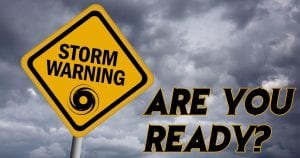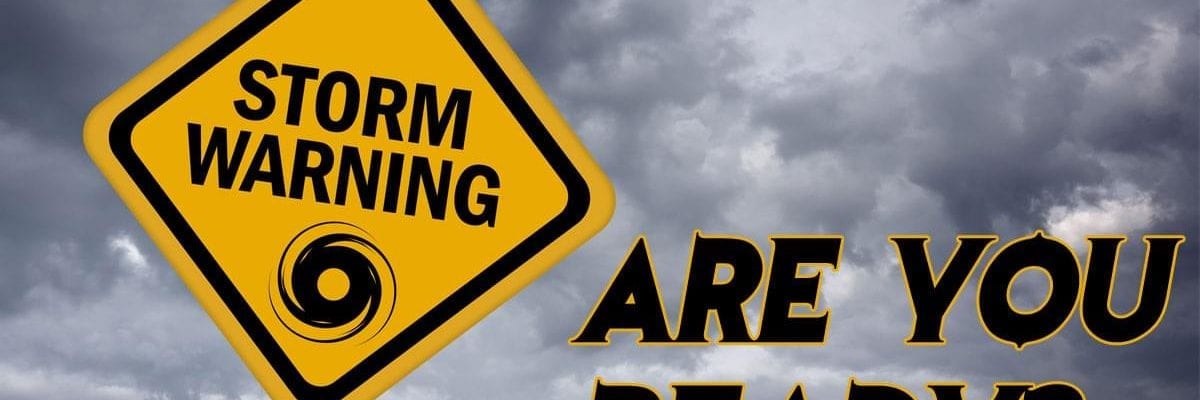 Each year hurricane season is from June to November, with the worst usually in August and September. Knowing how to prepare for a hurricane could truly be a life saver.
Each year hurricane season is from June to November, with the worst usually in August and September. Knowing how to prepare for a hurricane could truly be a life saver.
Some Hurricane facts
Understanding what a hurricane is and the differences between them are always helpful. forecasts. Storm conditions can vary on the intensity, size and even the angle which the tropical cyclone approaches your area, so it is vital you understand what the forecasters and news reporters are telling you.
Tropical Depressions are cyclones with winds of 38 mph. Tropical Storms vary in wind speeds from 39-73 mph while Hurricanes have winds 74 mph and greater. Typically, the upper right quadrant of the storm (the centre wrapping around the eye) is the most intense portion of the storm. The greatest threats are damaging winds, storm surge and flooding (especially for the coastal areas)
These are some of the important terms you will hear:
- Tropical Storm Watch: Tropical storm conditions are possible in the area.
- Hurricane Watch: Hurricane conditions are possible in the area.
Watches are issued 48 hours in advance of the anticipated onset of tropical storm force winds. - Tropical Storm Warning: Tropical storm conditions are expected in the area.
- Hurricane Warning: Hurricane conditions are expected in the area.
Warnings are issued 36 hours in advance of tropical storm force winds. - Eye: Clear, sometimes well-defined centre of the storm with calmer conditions.
- Eye Wall: Surrounding the eye, contains some of the most severe weather of the storm with the highest wind speed and largest precipitation.
- Rain Bands: Bands coming off the cyclone that produce severe weather conditions such as heavy rain, wind and tornadoes.
- Storm Surge: An often underestimated and deadly result of ocean water swelling as a result of a landfalling storm, and quickly flooding coastal and sometimes areas further inland.
During a watch, prepare the rental villa and have an evacuation plan in case a warning is issued. During a warning, carefully follow the directions of officials, and immediately leave the area if they advise it. In the event of an Extreme Wind Warning/Advisory, which means that extreme sustained winds of 115 mph or greater are expected to begin within an hour, immediately take shelter in the interior portion of the villa, this should be a room with no windows, or it could be the hall way.
Hurricane Forecasts
Predicting a tropical cyclone’s path can be difficult; there are many g factors that can change the direction or position and so you need to keep updated with the latest information. The storm’s size and path can directly influence what sort of wind patterns guide, enhance or hinder its growth, and vice versa! Forecasters have computers that take huge amounts of data and try to predict where the storm will go and usually can calculate 2-3 days out fairly accurately. The National Hurricane Centre has the most up-to-date information on tropical cyclone developments, forecasts and weather alerts, discussions analysing the data and more. http://www.nhc.noaa.gov/
Hurricane Names
Hurricane names are picked randomly, then rotated and recycled every 6 years. If a hurricane was catastrophic or severely deadly and costly (i.e. Charlie, Katrina, Irene) it is officially retired since use is not appropriate and can be confusing when naming current storms.
Hurricane Kits
It is important to create a kit of supplies that you could take with you if you are forced to evacuate. This kit will also be useful if you are able to stay in the rental villa, but are still affected by the storm, such as through the loss of power. One common trend seen when hurricanes are approaching is a wide-spread panic. When this happens, people rush in large numbers to get all the supplies they think they need. This is very difficult when you are on holiday/vacation because you may just be arriving. However you should do your best to prepare the following kit so that should you be evacuated you can easily take it with you and should you stay in the rental villa you are prepared to “wait out the storm” should you loose power. These are just a quick list of some essential things we would recommend
- Non-perishable food (enough to last at least 4 days) dried and canned food is recommended, remember if the power goes off you will have no refrigerator or cooker so make sure the food you get can still be eaten.
- Water (enough to last at least 4 days, 1 gallon per day per person is the recommended amount)
- First-aid kit
- Ensure you have enough prescription medication
- Flashlights (have extra batteries on hand enough to last 4 days)
- Battery operated radio (again, have extra batteries)
- Waterproof container with cash and important documents (bank ATM’s may go down and electronic payments may not be possible, so the cash is a must)
- Manual can opener
- Books, magazines, games for recreation
- Baby supplies if applicable
- Personal hygiene items and sanitation items if applicable
- Cooler and ice packs
- A plan for evacuation and for if family members are separated
Securing The rental villa
- Bring in all outdoor furniture, garbage cans, decorations, and anything else that is not tied down inside.
Power Outages
In the event a storm should leave you without power, there are a few things to consider and help you be ready and stay safe outside of your normal hurricane preparedness.
- Gas/Fuel: Make sure your tank is full far in advance of an approaching storm. Gas stations run out fast.
- ATMS: Have extra cash on hand in the event no ATMS in your area are accessible or working.
- Mobile (Cell) Phones: Charge your cell phone and limit use after power is out, ensure you charge any additional battery packs you may have.
- A/C: This can be the most uncomfortable side effect of losing power during a storm. Try to prevent as much light from entering and warming the house by covering up your windows on the inside.
- Water: Fill bathtubs and large containers with water for washing and flushing only.
- Food: Turn your fridge temperature down and/or freeze any food or drinking water that can be frozen if you expect a power outage.. Have a cooler with ice packs prepared to cool your drinks and snacks after power has been out for more than 4 hours.
During a Hurricane
During the storm, howling winds, driving rain, and the threat of tornadoes can make riding out a hurricane scary. Follow these tips for staying safe in the rental villa during a hurricane:
- Stay inside and away from windows, skylights, and glass doors. Find a safe area (an interior room like a closet or bathroom on the lower level).
- If flooding threatens your home, turn off electricity at the main breaker.
- If you lose power, turn off major appliances such as the air conditioner and water heater to reduce damage.
- Do not use electrical appliances, including your computer.
- Do not go outside. If the eye of the storm passes over your area, there will be a short period of calm, but at the other side of the eye, the wind speed rapidly increases to hurricane force and will come from the opposite direction. Also, do not go outside to see “what the wind feels like.” It is too easy to be hit by flying debris.
- Beware of lighting, stay away from electrical equipment and don’t use the phone or take a bath/shower during the storm.
After a Hurricane
More deaths and injuries occur after a hurricane hits than during. This is because people are too anxious to get outside and survey the damage and come into contact with downed power lines or unstable trees. Follow these suggestions for staying safe after a hurricane:
- Remain indoors until an official “all clear” is given.
- Do not touch fallen or low-hanging wires of any kind under any circumstances. Stay away from puddles with wires in or near them. Do not touch trees or other objects in contact with power lines.
- Use phones for emergencies only andcall 911 only for life-threatening situations.
- Watch for weakened roads, bridges, tree limbs, porches that could collapse unexpectedly, and never drive through floodwaters of any level.
- After power is restored, check refrigerated food for spoilage.
Remember, any severe storm can be deadly and destructive. If you’ve survived a landfilling cyclone, you know the inconvenience and distress it can cause. One of the best tips to be prepared is knowing the cycle of a cyclone – Approach, Arrival & Aftermath. Prepare ahead of time and listen to the directions of officials for the approach. Secure the rental villa, or find a safe shelter for its arrival, and know how to proceed safely during the aftermath.


